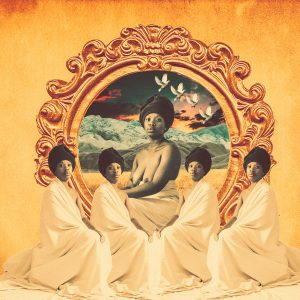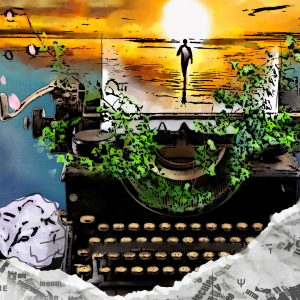Book Review | A pan-African poetry of belonging
In his latest poetry collection, Sihle Ntuli’s acute observations of history and place show that belonging is layered, fraught with problems and often unharmonious.
Author:
23 February 2021

When James Baldwin said, “Perhaps home is not a place but simply an irrevocable condition”, he was speaking about the most basic and visceral need to belong. Sihle Ntuli’s poetry collection, Rumblin’, published in late 2020 by uHlanga Press, explores this complex condition in two parts across 22 poems.
Ntuli dedicates the book, “To the ones who walk on, unable to shake the feeling.” It is a nod to those forever looking to understand themselves and their place in the world.
This collection is not limited by the boundaries of brevity inherent in poetry. Ntuli writes from acute observations of history and place, with a flair for including the cultural, linguistic and sensory dimensions that allow a poem to bloom. The poetry shows that belonging is layered, fraught and often unharmonious.

Rumblin’ demonstrates that human beings are complex. Our needs for and explorations of belonging are anything but simple. He does this not only in the content that he explores – which spans colonialism, patriarchy, structural and personal violence, community and purpose – but also in his ability to contain seeming contradictions within one poem.
Ntuli explains, “There may be those poems where I walk with you all the way and there will be a nice hug at the end. But I want to surprise, I want to keep the reader on their feet. You shouldn’t see it coming.”
Slow Jam saKwaMashu is one such poem. It manages to foreground familiar and safe community rituals such as blasting Luther Vandross on sound systems while braaing with an acute sense of degradation, loss and fear simmering beneath – or alongside. Ntuli sees both clearly and allows them to coexist.
Located in history
George Orwell once wrote: “The most effective way to destroy people is to deny and obliterate their own understanding of their history.” It is no surprise then that Ntuli centralises history as the foundations of our understanding of belonging. The poet has a masters in ancient civilisations and has lectured on history and belonging. About this he says, “Where we are today is a result of those foundations. Specifically those Western foundations, of which we are products.”
Related article:
The opening poem in the first draft of the manuscript, In Labour, is a poignant reflection on Black labour, beginning with the lines, “Arms wipe sweat from brow/ shield sunshine from the eyes”. Ntuli was thinking about the Bambatha Rebellion of 1906 when writing the poem, he says, and about the Zulu rebelling against British colonial rule and taxation in Natal, which forced men to enter the labour market.
The third stanza reads:
from the womb
towards the light
prophetic tears
down brown skin
Here Ntuli alludes not only to South Africa’s history of exploiting Black people for their labour but also to the institutionalisation and socialisation of them as only labourers from birth.
The final and titular poem Rumblin’ both suspends and centres African history. With no clear clues as to its setting in time, the poem evokes a strong historical – if not ancient – sensibility in the beginning through its imagery of footprints, heartbeats, blood, clasping, clenching and bones.
Its title is heard through the fast-paced metre, which reads with a continuous deep sound, a rumbling. The poem’s crescendo ends with a thunder promised by its title:
won’t you tell me
Azania
at the end
of all of this
will you live
again
Located in place
In Portrait with Keys Ivan Vladislavic writes about Johannesburg, “For the moment, the shell of the city is pressed to my ear.” In the same way, this collection connects place and belonging. Durban and KwaMashu are characters rolled out and fattened up through colloquial language, imagery, sensory descriptions and cultural references. Ntuli presses the shell of Durban and KwaMashu to the ear. Or to use Ntuli’s analogy in No Exit, the poetry collection is as much a vehicle for seeing these places as the number 750 bus that travels the length of Durban, from lively KwaMashu to leafy Musgrave.
In No Exit, instead of describing the passing scenery, Ntuli depicts an enthused churchgoer giving an impromptu congregational service on the bus. His ideas of place are told through seemingly insignificant details of everyday people. He writes:
their frail legs
steep strides up steps
arms pulling their bodies up
the driver handing back tickets
…
dabs along corners of her forehead
gentle strokes along the temples
our end foreshadowed
by a handkerchief
These observations become signifiers of social class in profoundly simple ways.
Then there is Durban, a poem that locates the city firmly within history. Durban is “whole fields/ institutionalized”. This is a succinct and clear reference to the sugar cane fields on the peripheries of the city. In three brief words, Ntuli is able to unfurl the devastating and long-lasting repercussions of colonialism and capitalism, simply by alluding to the sugar industry and its place in KwaZulu-Natal’s history.
Located in empathy and experience
Ntuli’s poetry also explores the intimate and personal. Nikki Giovanni said, “Writers write from empathy.” This describes Ntuli’s style, especially in For Bongani Mayosi and Free State.
The first poem pays tribute to Bongani Mayosi, an exceptional professor of cardiology and esteemed dean of the Faculty of Sciences at the University of Cape Town, who committed suicide in July 2018. The poem ends:
that they chose
not to understand
that they refused to hear
with eyes
that pretended
not to see
the intricacies of
His
Black
Pain
The poem interrogates a person’s capacity to remain coherent and whole within fundamentally alien and often hostile institutions – tertiary institutions, in this context.
Free State follows shortly after and hints at strong correlations between Bongani Mayosi’s University of Cape Town experience and Ntuli’s own experience at the University of Free State.
Ntuli remembers the 16 months he spent lecturing there: “The goal posts were continuously being moved and I had to be exceptional. I thought the best thing to do was to retain my mental health and my mental space, my harmony and my oneness and move away from that toxic space. And, of course, Bongani Mayosi’s story ties in with why I decided to resign as well because he wasn’t allowed and wasn’t given the opportunity to move away from there. His resignations were turned down by UCT.”
Ntuli’s empathetic and tender references to his experience interrogate his own sense of belonging – or, in this case, not belonging.
Related article:
Twin is by far the most personal of all the poems. Ntuli is a twin. He sees and understands so much of his own identity and belonging through how he relates to his brother.
Ntuli speaks in a softer tone when asked about his brother, saying, “He is a central figure in my life. I can’t say I am born alone and I will die alone. I always picture being in the womb with my brother and how it must have been. It is profound for me to think about the fact that we went from the very beginning. It goes beyond the idea of being a Day One. And I like that.”
His poem explores their birth, ending with extraordinary beauty:
there I found you
brother
waiting for me
on the other side of dawn
Located in language
When asked about his attitude to writing poetry in English, he responds, “It’s a bit of a betrayal.”
He opens his poem The Language with a quote from Dambudzo Marechera: “For a Black writer the language is very racist; you have to have harrowing fights and hair-raising panga duels with the language before you can make it do all that you want it to do.” Ntuli’s exploration of English as foreign, unfamiliar and alien shows it can inhibit one’s sense of belonging.
This theme has been explored by Black writers across the African continent for decades, and most famously by Kenyan author and postcolonial theorist Ngũgĩ wa Thiong’o in his book Decolonizing the Mind. In it he quotes Chinua Achebe’s 1964 speech The African Writer and the English Language, where he says, “Is it right that a man should abandon his mother tongue for someone else’s? It looks like a dreadful betrayal and produces a guilty feeling.”
Related article:
This guilt and betrayal that Achebe felt creates an obstacle to belonging. But all is not lost. Achebe later says, “I feel that the English language will be able to carry the weight of my African experience. But it will be a new English, still in full communion with its ancestral home but altered to suit new African surroundings.” Ntuli’s poetry does this. He is unafraid to wield the English language on his terms, throwing in a measure of isiZulu colloquialism and slang.
Ntuli says, “For me, Rumblin’ is a pan-African text that explores various facets that make us, us. I wanted to see a more revitalised and centred understanding of blackness and, of course, for others to look within themselves and to find purpose.”
That is what Rumblin’ gives us: the chance to find purpose and, more specifically perhaps, belonging.



